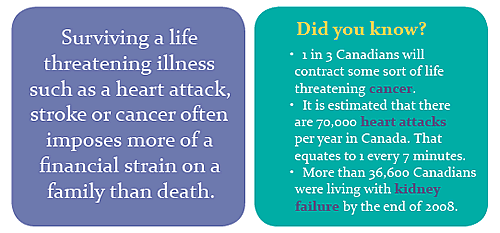Health risks are real and random, no matter who you are. Every four minutes a Canadian is diagnosed with cancer and more than 400,000 Canadians are currently living with the long-term effects of a stroke.
Your most important asset isn’t your home or your car or any of the other things for which you may buy insurance. Your most important asset is your ability to earn an income.

If you have family, loved ones, or a home or business to take care of, you should take a look at the benefits critical illness insurance can offer.
Could you…
- Pay all of your bills and maintain your standard of living?
- Keep your long-term financial goals and plans intact, such as your retirement, saving for a child’s education, paying your mortgage or saving for a house?
- Have options for yourself or the people you care about, allowing time and financial help to make decisions that are right for you?
- Pay for medical costs not covered by the government or employee health plans?
- Be away from your business and keep things going?
- Provide one less thing to worry about during a difficult time?
Across the media, on almost a daily basis, you see stories about Canadians who have been diagnosed with critical conditions and are struggling to pay for the financial costs and loss of income associated with these conditions. Too many people have had to start crowdfunding campaigns to get family, friends and strangers to help pay for the cost of treatments, travel, or for basic living expenses. In all of these cases, if they possessed critical illness insurance, they would not have the added stress of asking for financial support.
Clearly, based on these statistics and the potential seriousness of lost income and additional expenses associated with a critical illness, many answer the question, "is critical illness insurance a necessary precaution?" with a resounding "yes".
5 Things You May Be Wondering About Critical Illness Insurance
If you’re not familiar with critical illness insurance and how it works, here is some information to get you started:
1. What does critical illness insurance cover?
A critical illness is a condition that could prevent you from working or carrying on your regular routine. Each insurance company covers different conditions. Certain cancers, heart attack and stroke are the most commonly covered conditions.
2. What can critical illness insurance do for me?
Critical illness insurance can give you a tax-free, lump-sum payment to use however you want. You can also customize your policy to get some or all of your money back if you don’t come down with an illness.
3. Is critical illness insurance expensive?
Everyone’s idea of what’s expensive and what’s not is different based on their personal financial situation. Critical illness insurance can be a lot less expensive than paying out-of-pocket for medical expenses that aren’t covered by the government health plan or your employee benefits. It can also be a lot less costly than having to worry about paying your regular bills (mortgage, car payments, utilities, etc.) while you or your spouse is in treatment or recovery. For instance, a non-smoking 35 year old man will genrally pay approximately between $20 and $30 a month for $50,000 of critical illness insurance coverage.
4. Will I get the money if I make a claim?
If you are diagnosed with a covered critical condition and survive the waiting period (typically 30 days), you’ll receive a lump-sum payment equal to your coverage amount. That money is yours to spend however you like. Cover living expenses, pay for medication that isn’t covered by the government health plan, or even take a trip when you’re well.
5. Is critical illness insurance difficult to acquire?
Each insurance company has different qualifications, but most individuals can obtain critical illness insurance of some kind. You will be asked a variety of questions, including details about your family medical history and may also be required to complete some medical tests. The best way to start this process and find out more is to contact a professional insurance advisor.
Related Reading: What to Know When Making a Critical Insurance Claim